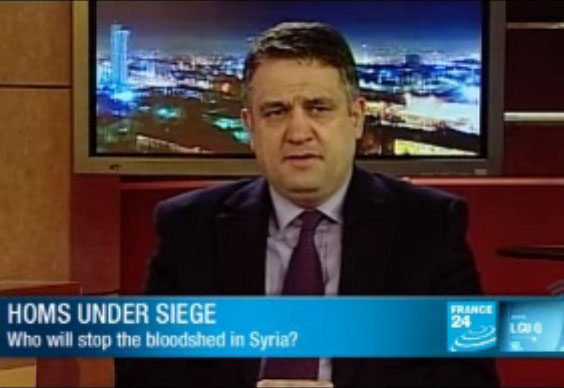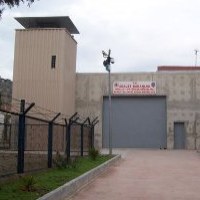![]()
RubinReports | By Barry Rubin
“How many goodly creatures are there here!
How beauteous mankind is! O brave new world,
That has such people in’t!”
“Caliban has a new master….Freedom, hey-day! hey-day, freedom! freedom, hey-day, freedom!”
— William Shakespeare, “The Tempest”

STRATIM Director Suat Kiniklioglu. STRATIM is a non-governmental organization that aims to facilitate strategic communication for Turkey both at home and abroad. (Source: www.stratim.org.tr/en/about-us.html)
If you want a sense of where the Middle East is going, consider this viewpoint from an unlikely source. Suat Kiniklioglu is not just a member of the Turkish Parliament for the ruling (Islamist) AK party, he’s a member of the party’s Central Executive Committee and deputy chair of the party’s foreign affairs commission. In other words, he’s a very important person in Turkey’s ruling establishment and especially foreign policy.
Yet rather than take an optimistic view about the advance of Islamic politics in the region, he’s very worried, worried enough to write a column entitled, “Back to a Barbarian Age” in the May 16 edition of the Islamist newspaper, Today’s Zaman.
What is this barbarianism? It consists of rising group hatred and looking down on others as culturally inferior and uncivilized. One might think he’s about to launch still another attack on the West as evil, imperialistic, and anti-Muslim. Not at all.
His complaint is:
“We are now back to the very primordial identities that once dominated our political behavior and determined the group to which we belonged or were seen as belonging. We are no longer socialists, conservatives or liberals. These days we are first judged by what tribe we belong to and more increasingly what faith we believe in.”
Yes, he continues, “I am constantly reminded in Europe and the US that I am a Muslim.” It is interesting to note that he was born in Germany and clearly that played a role in making him identify himself as a Muslim (and not just a Turk) that he ended up in the AK party.
But his complaints are about the Middle East:
“When I travel in the Middle East, I am reminded that I am a Sunni. The Middle East is being ravaged by barbarians who want to divide the world into Sunni and Shiite. We can no longer make any political assessment without entertaining these ethnic, religious and sectarian identities. We are truly back to the Middle Ages. All of our accumulated knowledge, sophistication and political culture seems to have been lost. The Middle East is pervaded and increasingly infected by the sectarian rivalry between the Shiite Persians and the Wahhabi Saudis, who are now fighting proxy wars all over the region. As if we are all in agreement with the Saudis’ extremely harsh interpretation of Wahhabism, we Sunnis find ourselves in the same camp.”
Note what he’s saying here. On one hand, there is a Shia bloc led by Iran; on the other is a hardline Sunni Islamism which he blames on Saudi Arabia but might just as well refer to the Muslim Brotherhood. These two camps are now waging war in Syria for their “primordial and primitive agenda.” These “barbarians” (Islamists) “have blatantly hijacked the push for a normal democratic order in Syria,” instead committing acts of terrorism that must be condemned.
And then he concludes:
“With all its sins and shortcomings, the secular order we [Turks] established over the last eight decades has taken hold and promises to support our sociopolitical order.”
Why would a leading figure in an Islamist party identify the era of rising Islamism as a “great shame…[in which the Middle East ] fell prey to the thirst of barbarian bloodshed”?
Part of the answer is specifically Turkish:
— Kiniklioglu is one of those moderates swept up into the AK, in his case an expert on communications and foreign affairs, who may not be comfortable with the party’s program.
— In addition, he is (correctly) asserting that (up to now) Turkish Islam has been more moderate than the versions in Iran and the Arabic-speaking world. This is common, however, among others — I’ve often heard it from Egyptians — seeking to blame everything on the Saudis and Iranians. Ironically, (perhaps subversively?) he is praising the (secular) Turkish republic which his own party is now dismantling.
— He’s describing the biggest headache for Turkish foreign policy since a battle between Sunni (Arab) Muslims and Shia (Iranian-led) Muslims is crowding Turkey out of any real influence in the region.
But I note something else here, too: Genuine fear of what Islamic and Islamist politics have unleashed. Not the utopian brotherhood of the international Islamic community (umma) pushing out competing nationalist conflicts, but rather the evil genie of hatred, jihad among “brothers,” war, murder, and intolerance.
It involves the persecution of Christians and turning them into refugees, as well as the threat of renewed war with Israel. But it also puts a fuse to set off bloody conflicts in Iraq (as we have already seen), Lebanon, Syria, and Bahrain. Just as Arab nationalism pledged unity and brought decades of strife among Arab regimes, political Islam is the weapon and motive for new conflicts.
We have already seen its devastating role in Afghanistan, Iran, the Gaza Strip, Iraq, Lebanon, and Sudan. Many in the West are in denial. (Even the use of the word “barbarian” in this context would bring down charges of second-degree hate crime upon a non-Muslim.) But I think Kiniklioglu and a lot of other Muslims are beginning to see the scary new world that he and his counterparts have set into motion.



 RSS
RSS










Latest Comments
Hello Mike, Thank you for your positive feedback to the article. I felt there wasn’t too much critical analysis of ...
Thanks for this considered and well constructed article. A follow up article on the manner in which the editorial contro...
THE CLUELESSNESS OF CLAIMING THAT OBAMA'S MIDDLE EAST POLICIES WERE A FAILURE CANNOT BE FURTHER FROM THE TRUTH, WHAT THE...
As long as Obama is the president of the usa do not trust the us government......
Thank you for an good read....